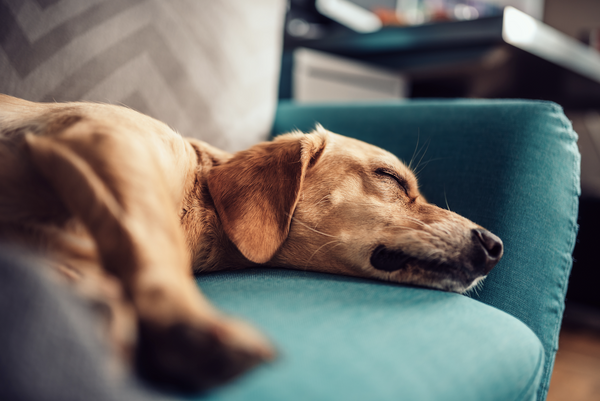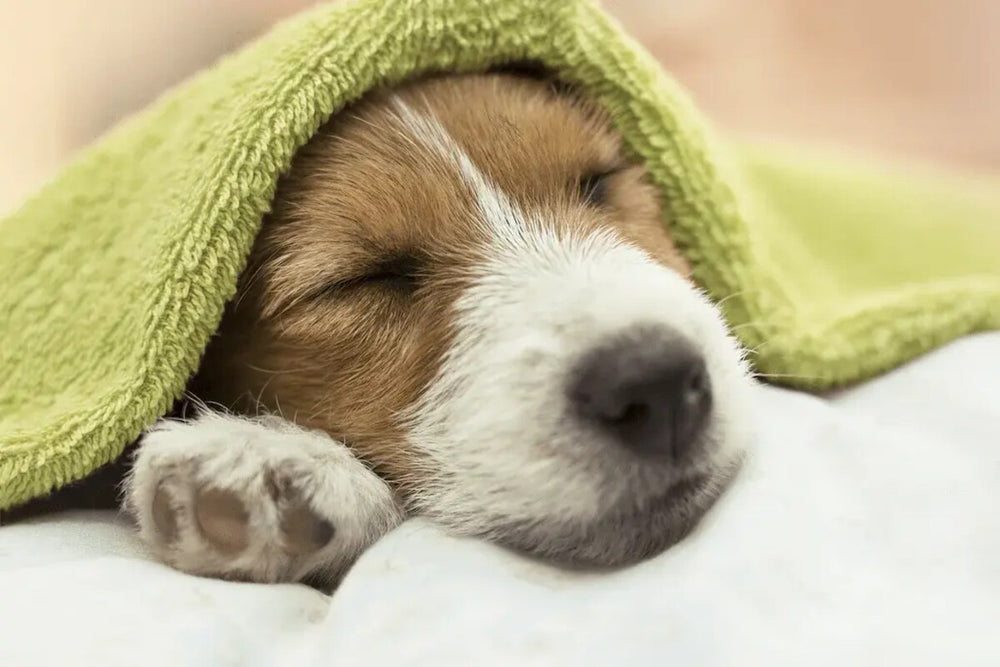Take a look at your dog. Chances are, he or she is fast asleep right now. Our canine companions certainly do seem to get a lot of shut-eye. If you've ever asked yourself "Why does my dog sleep so much?" you're not alone.
Our dogs' sleeping patterns are a bit more complex than our own. We tend to be awake during the daytime and asleep for most of the nighttime. A dog's sleep pattern isn't that simple, though. And the truth is that dogs need more sleep than we do. So, nine times out of 10, it's normal for your dog to spend large chunks of their day sleeping.
Let's take a closer look at a healthy dog's sleeping habits and discover whether dogs can sleep too much or too little. Then, we can answer your ultimate question: Why does my dog sleep so much?
How Much Should Healthy Dogs Sleep?
Your dog probably spends the entire night asleep and then sleeps through much of the day. While that might differ from your own sleeping pattern, it's not unusual for your pooch.
The average dog sleeps between 12 and 14 hours of day — those hours are comprised of overnight sleep and daytime naps. They'll often get several hours of sleep overnight, perhaps seven or eight hours, and then sleep sporadically throughout the day.
Just like us, dogs need rapid eye movement sleep (REM sleep) to stay healthy. REM sleep is a period of deep sleep that lets our bodies enter a restorative phase to strengthen brain health, body tissue, and the immune system. Dogs get REM sleep overnight, but they also enter the REM sleep cycle faster than humans. That means they're often getting REM sleep during their daytime naps, too.
If you're wondering "Why does my dog sleep so much?" the answer is simple: It's natural. Your dog needs more sleep than you. So, in most cases, if you see your dog sleeping the day away after they've had a restful night's sleep, there's nothing to worry about.
With that being said, pet parents should watch out for a few things when it comes to Fido's sleep habits.
Can Dogs Sleep Too Much?

The amount of time your dog sleeps will vary depending on a variety of factors, including:
- Breed. Certain dog breeds just like to sleep more than others. Bulldogs, greyhounds, and large breeds like Mastiffs and Newfoundlands tend to sleep more than little Chihuahuas, for example.
- Age. Older dogs sleep more than most average adult dogs. Puppies need a lot of sleep as well, usually between 18 and 20 hours a day during the first few weeks of life.
- Activity level. A working dog on a farm gets a lot more daily activity than a dog who goes on one walk a day. Your dog might sleep more or less depending on their activity level. Typically, a dog who is more active throughout the day will need more sleep to recover.
While there is no one-size-fits-all answer for the amount of sleep your dog should be getting, excessive sleep can indicate underlying health issues.
A hormonal issue like hypothyroidism is one possibility. It involves a malfunctioning of your dog's thyroid gland, resulting in too little of the thyroid hormone being administered into the bloodstream. One symptom of this disorder is lethargy, or low energy levels. You'll probably see this when your dog sleeps more than usual. Other symptoms of hypothyroidism include intolerance to exercise, excessive shedding, hair loss, and possible weight gain.
Obesity is a more common possibility. If your dog is carrying around a lot of extra weight, they're probably less keen to get up and be active. Of course, obesity is very bad for your dog's health, so you'll want to consult your veterinarian about getting your pet back to a healthy weight as soon as possible. Dogs are considered obese when they weigh more than 20% over their ideal body weight. You can try calculating this yourself at home, or simply check with your veterinarian about whether your dog’s at a healthy weight.
Of course, obesity is tied directly to your dog’s diet. If you’re looking for an easy way to give your dog's diet a healthy boost without adding a lot of extra calories, Native Pet's all-natural Probiotic Powder is a great choice. Our formula helps support a thriving environment in your dog's gut — that's great for your pet’s digestive system and their overall health.
What If My Dog Isn't Sleeping Enough?

In the same way that dogs can sleep too much, it's also possible that your dog isn't getting the amount of sleep that they need. Possible reasons for this include:
Sleep Apnea
Sleep apnea is most commonly seen in overweight dogs and brachycephalic breeds (those with squashed, flat faces like bulldogs, pugs, and the Pekingese). Tissue in the back of a dog’s throat collapses into the airway during sleep, causing them to jolt awake. This might happen various times throughout the night or during a nap.
Most cases of sleep apnea can be remedied if your dog loses weight. Dietary changes can also help. Dog owners should contact their veterinarian if they think their pooch might be suffering from sleep apnea.
Arthritis
Senior dogs commonly suffer from the painful joint inflammation of arthritis. This can keep your canine companion up at night, simply because they can't get comfortable. Talk to your vet about possible solutions like pain medication, an orthopedic dog bed, or physical therapy.
Wish you could help your dog stave off the inflammation and pain associated with arthritis? Native Pet's Hip and Joint Chicken Chews can help. Packed with green-lipped mussel, polyphenols, and collagen, these chews help support the joints to reduce pain, inflammation, and swelling.
Pain, Injury, or Illness
Whether it's from arthritis or a physical injury, pain can keep your dog up at night. And a dog that is sick with an illness of some kind, from a disease like parvovirus to a parasitic worm infestation, might lose out on sleep because of the discomfort. If you can't determine another reason for your dog's restlessness at night or throughout the day, it's time to schedule a checkup at the vet's office.
Why Does My Dog Sleep So Much?
Why do dogs sleep most of their day away? It's simply natural. Healthy adult dogs need about 12 to 14 hours of sleep in a 24-hour period. They'll typically sleep overnight and then spend several hours per day napping. And as dogs age, they tend to sleep more. Older dogs might sleep more than 14 hours per day. Young puppies snooze a lot, too, sometimes up to 20 hours a day or more.
Remember that the exact amount your dog sleeps per day will vary depending on factors like their breed, age, overall health, and activity level.
However, it’s possible for dogs to sleep too much. This could be caused by something as simple as obesity, or it could be tied to a hormonal imbalance like hypothyroidism. Dogs can also get too little sleep, perhaps because of arthritis pain, an injury, or sleep apnea.
Here's what to keep in mind: If you're concerned about your dog's sleep schedule in any way, or if there is any kind of sudden change to your dog's sleeping pattern, check with your veterinarian for a professional opinion. Otherwise, it's fine to let sleeping dogs lie.
If you would like additional insights into your dog's health and wellness, visit the Native Pet blog to read more great articles.


